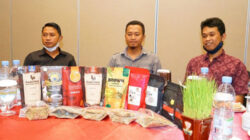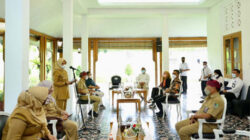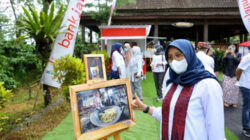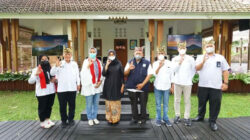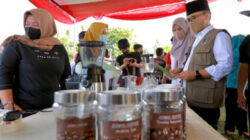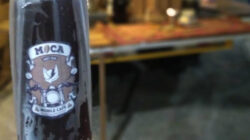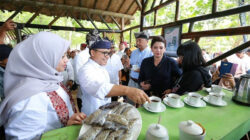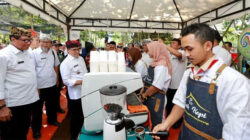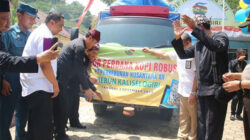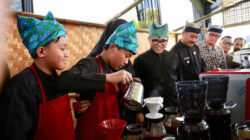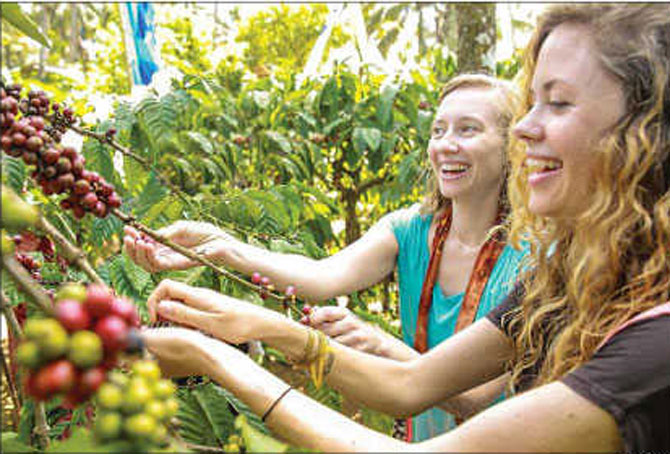
MESKI pasar nasional dan internasional lebih menyukai kopi jenis Robusta dan Arabika, citra kopi lokal di Banyuwangi tetap istimewa di kalangan pencinta kopi. Terutama masyarakat pedesaan yang memng tidak lepas dari budaya mengonsumsi kopi sebagai social drink.
Di Gombengsari dan Desa Kelir, Kecamatan Kalipuro, masyarakat masih mempertahankan kopi-kopi lokal meski dalam jumlah yang tidak terlalu banyak. Asmah, 55, salah seorang petani kopi di lingkungan Kacangan, Gombengsari mengatakan, kopi lokal kebanyakan menjadi konsumsi pribadi.
Karena perkebunan maupun pengepul jarang ada yang mau membeli kopi lokal dalam jumlah besar. Meski begitu, bukan berarti kopi lokal tanpa peminat. Menurut Asmah, pembeli kopi lokal tetap ada. Bahkan pasarnya dapat dibilang pasar khusus karena yang membeli adalah kalangan tertentu yang memang sangat menyukai kopi lokal.
Dari keterangan Asmah, ada sekitar empat jenis kopi lokal Banyuwangi yang masih dipertahankan petani hingga saat ini. Yaitu jenis poniha/muniha, buriah/glodok, keleres dan tokosari. Empat kopi ini memiliki keutuhan dan keunggulan semdiri baik dari segi rasa dan harga.
Kopi jenis keleres misalnya, Asmah menggambarkan kopi ini memiliki bentuk lonjong dengan buah yang tipis, namun berbiji besar. Kopi ini adalah salah satu jenis kopi paling kuno yang masih dipertahankan. Dari segi rasa kopi ini bisa dibilang yang paling pahit. Sehingga; banyak orang yang seringkali mencampur kopi ini dengang berbagai bahan lain seperti beras dan jagung sebelum menjadi serbuk dan dikonsumsi.
“Keleres ini bijinya besar, jadi kalau dijual bagus karena hasilnya banyak. Harganya sekitar Rp 16 ribu per kilogramnya untuk biji kering. Kopi ini juga kata orang namanya kopi jamu, tapi walau pahit banyak yang suka, apalagi orang madura” ujar Asmah.
Senada dengan Asmah, Mungkodi, 68, seorang pengepul kopi lokal dari Desa Kelir mengatakan, jika kopi keleres ini yang paling dipertahankan keberadaannya. Terkadang masyarakat pedesaan sengaja menanam kopi jenis ini di belakang rumah atau di kebunnya.
Karena pohon dari kopi keleres tidak terlalu besar, sehingga mudah dirawat. Kemudian untuk jenis kopi lokal lainnya yang cukup disenangi adalah poniha atau muniha. Kopi jenis ini memang berukuran kecil baik dari buah maupun bijinya.
Semakin kecil setelah dijemur kering. Meski begitu, harganya kata Mungkodi bisa dibilang paling tinggi di antara kopi lokal Banyuwangi. Kopi jenis ini menjadi makanan dari hewan luwak yang kemudian dikenal sebagai kopi luwak.
Selain itu kafeinya juga dibilang cukup tinggi dengan rasanya yang sedikit asam. Per kilogram biji keringnya dihargai hingga Rp 35 ribu.” Poniha ini pohonnya lebat. Buahnya juga banyak, yang dimakan luak juga kopi ini. Makanya harganya mahal. Yang mencari banyak. cuma jumlahnya tidak terlalu banyak. Tapi ya ada saja yang menanam,” ujar pria yang juga menjadi seniman barong itu.
Jenis kopi lokal Banyuwangi lainnya adalah, yaitu tokosari yang disebut-sebut sebagai salah satu jenis kopi yang paling banyak diproduksi masal. Rasa kopi ini disebut Mungkodi mirip dengan kopi Arabica. Harganya pun cukup bagus berkisar dari Rp 14 ribu hingga Rp 20 ribu per kilogramnya.
Bagi lidah pencinta kopi lokal, dianggap kurang nikmat. “Tokosari masih banyak yang mau membeli. Buahnya besar bijinya juga besar, katanya bagus buat produksi, yang menanam juga masih banyak, tapi untuk dijual saja,” terangnya.
Yang terakhir adalah kopi jenis buriah atau glodok. Kopi lokal ini dapat dikenali dengan ciri pohonnya yang dibilang cukup tinggi dibanding kopi lainya. Jika pohon kopi umumnya hanya memiki tinggi maksimal 1,5 meter, pohon kopi buriah bisa mencapai tinggi sampai 5 meter.
Karena ukuran pohon itulah Mungkodi menilai, jarang ada perkebunan yang mau membudidayakan kopi ini. Namun ada juga orang yang mengakali dengan malakukan stek agar tetap bisa menikmati kopi buriah namun dengan pohon yang tidak terlalu tinggi.
“Buriah ini kulitnya tebal, bijinya juga lumayan. Kata orang ada sedikit aroma nangka di kopi ini. Harganya juga hampir sama dengan kopi poniha. Cuma yang menanam jarang, panennya susah,” ucapnya, (radar)


